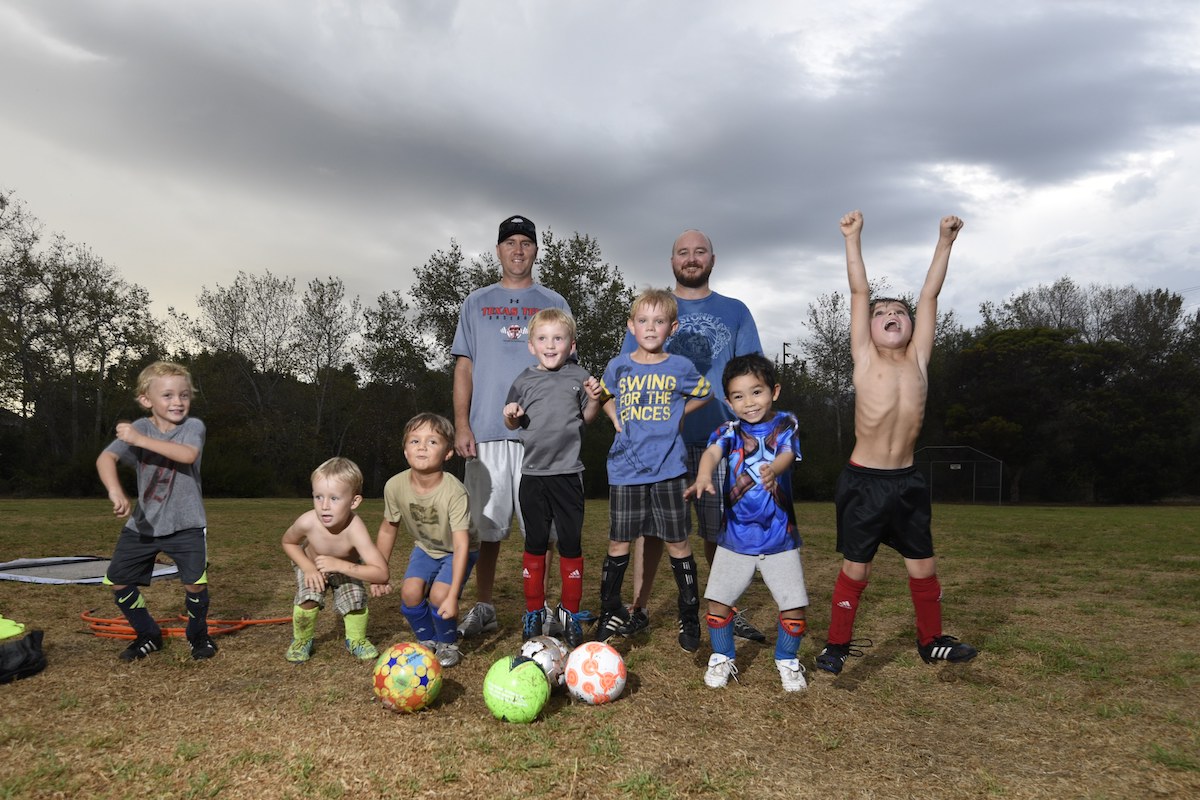I’m Not Santa Barbara’s Ted Lasso
Memories of Coaching Kindergarten Soccer, an Awful, Awesome Experience for Young Parents

My soccer coaching career began with an email to the parents of kids I’d never met, assuring them that their 5-year-old boys would be safe under my watch and that — despite no experience on the pitch since I spent games picking flowers as a 10-year-old — I may even be able to teach them how to kick a ball.
My rationale was that I’d watched plenty of soccer since ditching the sport nearly three decades earlier, including many World Cups (one in person!), a few Olympics, and the occasional Premier or Champions league match when nothing else was on TV. More critically, I mentioned that the sport ran a bit in my blood, since my cousin played professional soccer for a few years before marrying Aly Wagner. Far better-known than he, Aly spent about a decade winning gold medals and World Cups with the U.S. Women’s National Soccer team, and went on to become an even more famous commentator — the first woman to announce a male World Cup match in American broadcast history, in fact.

Though my cousin was skeptical of my tactics — or, as he replied sternly via email, “Do not associate us with your soccer coaching!” — the parents obliged, bringing seven kids to our first practice at a very lumpy ankle-breaker of a field. Like my own son, this was their first foray into organized sport, a role that soccer plays for so many Americans, myself included. It’s also where parents like me break into coaching, after much cajoling from the league about how the season may not start unless enough coaches sign up. With no stakes on the line — they don’t even keep score at that age — I figured this was my best chance to check that parenting responsibility box, and, hey, maybe I’d even be good at it. Only one of those notions proved true.
I scoped the squad for some natural or at least pre-packaged talent, and I got lucky: two Brazilians! Futebol is life for every single Brazilian, I already knew, and they all possess Pelé-esque talent, so these two boys will be able to show everyone else what to do. Unfortunately, the shine of that stereotype wore off immediately: One kid was an average soccer player, like most everyone else on the team — except, of course, for the other Brazilian boy, who very clearly wanted nothing to do with soccer, being on the field, or touching the ball whatsoever.
I just had to fall back on the drills and skills I acquired during the mandatory coaching lessons, online quizzes, and volunteered advice, such as buying cones, practice jerseys, pop-up goals. Then I spent the majority of our practices trying to keep the kids from kicking the cones, from ripping the oversize jerseys, and from using the flimsy goals as jungle gyms. The line between coaching 5-year-olds and babysitting is faint, though at least some of the moms tended to stick around for the weekly follies. At least I was entertaining for someone.
Our jerseys were of the fluorescent chartreuse variety, but my advocacy for calling us the Highlighters flew a little over their heads, so we wound up with the Flashes. I never really understood that, but it did make sense on the day we were practicing when an ultra-rare thunderstorm started rolling in, complete with flashes of lightning.
I hadn’t really paid attention to the lightning part of the lessons — was it hiding in the car with windows open, or closed? So our assistant coach, Justin, and I merely traded concerned looks as the dark clouds approached, the rain poured harder, and all of our shirts got drenched, including those of the moms watching. Eventually, as the flashes drew closer to the Flashes, we decided that we’d screamed at children enough for the day and packed up.
Screaming at children is also what best describes the games, with “Other way!” being the most common command. Though no score was kept, we were utterly obliterated in most every game, though there may have been a near-tie. Just getting a goal was a major weekly milestone, and one of our players did that the most, though he went on to baseball and now mostly rides e-bikes.

One day, after the kids had been in kindergarten for some time, we set up a scrimmage against the girls’ team in their class. Justin and I assumed they would crush us, and we knew that might be devastating for our boys, but figured it would be a great lesson in resilience. We didn’t even get that one right: The boys actually beat the girls rather handily. That some of the same girls would go on to repeatedly whip some of the same boys in flag football years later brought balance back to the neighborhood sporting universe.
During one of the last games, I noticed that the uninterested Brazilian was actually showing some initiative, getting his foot near the ball, and then flashing fingers toward the sidelines. “What’s he doing?” I asked his mom. “Oh,” she replied. “My mom said she’d give him a quarter for every time he touched the ball.” I laughed out loud, then offered, “Shit, I’ll give him five bucks if he scores a goal!” I knew my wallet was safe.

As such banter may suggest, I was not a great coach, and not much better as a babysitter either, though no one went missing or was irreparably injured. Justin, being an Army vet, proved a much better drill sergeant, and he carried that experience into a respectable career coaching adolescent baseball and basketball. My role evolved more into manager: keeping everyone abreast of the schedule and, most importantly for the players, reminding who was bringing halftime and post-game snacks, a competitive sport all itself.
Dismal non-record aside, the season achieved auxiliary goals. Because the league organized these young teams by neighborhood, most of the boys we coached remain good friends today, and we remain good friends with many of the parents as well. No other sport, activity, or even school event created relationships like that first season, far worth the price of frustration.
More strategically, or some may say selfishly, I have relied on my inaugural coaching experience — plus the next season, when I bowed to league pressure again to be an assistant coach — as the perfect excuse for why I shouldn’t be required to coach again. It’s the first thing I say when I shake the next coach’s hand — “I remember when I coached….” — and I seem to get at least a slight nod of acceptance each time.
I’m no Ted Lasso, and that’s fine, because I was able to satisfy a fatherly deed at a time when winning, or even kicking balls the right way, didn’t matter. For young dads and moms pondering whether they too should bow to pressure and put on a coaching hat, my advice is to do it when they’re young. Your kids may not remember it much, but it’s at least one hall pass for the rest of parenthood that’s worth the work.




You must be logged in to post a comment.